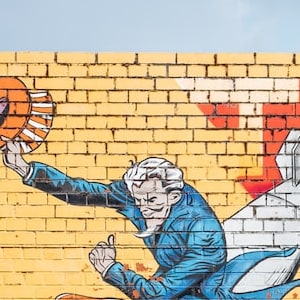big deal: Idiom Meaning and Origin
What does ‘big deal’ mean?
The idiom *big deal* is typically used to express sarcasm or dismissal towards something that is not significant or important.

Idiom Explorer
The idiom "it's none of your business" means that a person should not interfere or ask about something that does not concern them.
The idiom "in a big way" means to do something on a large scale, with great intensity or significance.
The idiom "great deal" means a large amount or quantity of something. It is used to indicate that there is a significant or considerable extent or degree of something.
The idiom "go hang" is used to express dismissal, rejection, or indifference towards someone or something. It implies that the person or thing being referred to is not worth the speaker's attention or consideration.
An idiom used to express frustration, shock, or annoyance, often in an exasperated or pleading tone.
The idiom "fat chance" is used sarcastically to convey that there is no or little likelihood of something happening.
The idiom "dime's worth" implies a small or insignificant value, often used to express the lack of significance or impact of something.
An idiom used to describe something ordinary, typical, or unremarkable.
The Mystery Explored
The idiomatic expression "big deal" is a phrase commonly used in American English to express a lack of enthusiasm or underwhelm. It has a figurative meaning that extends beyond its literal interpretation. To fully understand the connotations and implications associated with this phrase, it is important to analyze its historical and cultural origins.
This idiom, "big deal," emerged as a way of expressing sarcasm or dismissal towards something that was supposed to be significant or impressive. Dating back to the early 20th century, the word "big" in this context suggests importance or magnitude, while "deal" represents an event or matter of concern. However, when used sarcastically, the phrase downplays the perceived significance, indicating that the situation or topic is unremarkable or insignificant.
The exact timeline of the idiom's emergence and popularization is difficult to ascertain, as idiomatic expressions often evolve naturally within different social groups over time. Nevertheless, it has become firmly ingrained in the American vernacular, regularly heard in everyday conversations, popular media, and even formal contexts.
This idiom works as a rhetorical device that relies heavily on tone and context. The speaker's delivery and the surrounding conversation play crucial roles in conveying the intended meaning of the phrase. Facial expressions, body language, and vocal inflections play a vital part in how "big deal" is received and understood.
Despite its widespread usage, the phrase "big deal" does not have a universally fixed interpretation. Its meaning can vary depending on the situation, individuals involved, and the overall context of the conversation. While it generally signifies a sense of apathy or disinterest, it can also be employed to suggest irony, skepticism, or even annoyance.
In essence, the idiom "big deal" has come to symbolize the casual dismissal or undervaluing of something that is supposedly important or noteworthy. By using this phrase, speakers convey their lack of enthusiasm or belief in the significance of a particular matter. However, it is important to note that the idiom's meaning can be subjective and open to interpretation.
When exploring idioms like "big deal," one finds a wide range of applications and interpretations. Their meanings and implications often depend on the linguistic and cultural context in which they are used, as well as the individuals involved in the conversation. Idioms provide insights into the rich tapestry of language and its ever-evolving nature, as they are shaped by the everyday experiences and interactions of the people who use them.
The idiom "big fat" is related to the phrase "big deal." The addition of the word "fat" serves as an intensifier, emphasizing the lack of interest or enthusiasm in a stronger manner. For example, if someone says, "It's just a big fat deal," they are expressing an even greater dismissal or lack of belief in the significance of the matter at hand.
Another related idiom is "big old." Similar to "big deal," it conveys a sense of casual dismissal but adds the word "old" to emphasize the perceived insignificance even further. For instance, if someone says, "It's just a big old deal," they are emphasizing their lack of interest or belief in the importance of the situation.
The idiomatic expression "great deal" bears similarity to "big deal" in terms of conveying a sense of casual dismissal or lack of enthusiasm. However, "great deal" often carries a slightly different connotation, suggesting that the matter at hand is not worth much attention or consideration. It can be used to downplay the significance of something without employing the sarcasm inherent in "big deal."
Similarly, "a good deal" is another idiom related to "big deal" that conveys a lack of interest or enthusiasm. However, "a good deal" often implies that the matter in question is not worth the effort or attention it may require. It suggests a lack of value or importance, similar to "big deal."
Example usage
Here are three examples of how the idiom "big deal" can be used in a sentence:
- So what if he got a promotion? It's not a big deal.
- She made such a big deal about him forgetting their anniversary.
- Don't make a big deal out of it, it's just a small mistake.
The idiom "big deal" is often used to downplay the importance or significance of something. It can be used to express indifference or to dismiss the importance of a situation or event. In the first example, the speaker is expressing that a promotion is not something significant. In the second example, the speaker is highlighting someone's exaggerated reaction to a forgotten anniversary. Finally, in the third example, the speaker is telling someone not to overreact to a small mistake.
More "Expression" idioms



